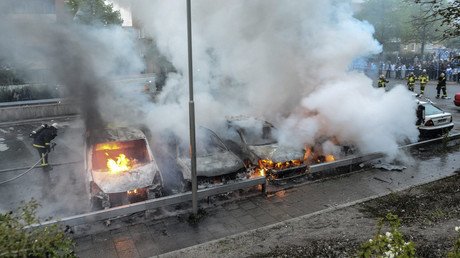UPS stops delivering to Swedish neighborhood as drivers get attacked in ‘no-go zone’ – report
The American shipping company has reportedly stopped delivering parcels to a notorious neighborhood in Malmo, Sweden, often labeled a “no-go zone,” following a wave of attacks on their drivers.
Providing postal services for Rosengard, a neighborhood in the southern city of Malmo, proved to be too dangerous for UPS, according to local media. The revelation came to light after a local man, Marco Padoan, ordered delivery of business cards to his home address.
Instead, he received a UPS message saying they failed to deliver the parcel to the door and diverted it to the company’s office in central Malmo. The company that printed out his business cards explained in an email that UPS stopped servicing the area because the drivers risked being exposed to robberies or other crimes.
The postal service itself did not respond to Padoan’s queries. However, Sydsvenskan newspaper did manage to get the following confirmation: “Our drivers have been attacked and therefore we have decided not to hand out packages at [the district].”
The company did not give any further explanation to the restriction. RT has requested comment from UPS.
Rosengard, a troubled, immigrant-dominated neighborhood, has gained notoriety due to a spike in violent crime recorded in recent years. Gun violence, armed robberies, and other offenses seem to have become commonplace there, according to media reports. The district, plagued by unemployment and poverty, has previously appeared on a list of Sweden’s ‘vulnerable areas’, which some media and local politicians refer to as ‘no-go zones’.
The Swedish government has consistently rejected using the term, admitting that while there are difficulties in certain neighborhoods, they are not places in which police and other agencies cannot effectively work. But in 2017, several police chiefs said in a widely quoted article that there were “parallel societies” in Malmo and other cities whose members reject the “basic institutions of [Swedish] society.”
They also complained that it was “hard for police to fulfil [their] mission” in these neighborhoods due to heavy gang presence, inadvertently fueling a nationwide debate on ‘no-go zones’.
Also on rt.com Army in Swedish ghettos? How Europe tries to adapt to migration instead of solving itAcross Europe, the term is typically used to describe a crime-ridden area where even the police are often afraid to go. The existence of these areas has been the subject of much controversy and debate, with some suggesting the very concept is discriminatory and prone to biased generalization.
For some local service providers at least, the words ‘no-go zones’ are taken quite literally. In 2017, the Swedish ambulance union said first responders need military-grade protective gear to withstand the dangers of such areas. Later that year, the government-run postal service, PostNord, halted mail delivery to some addresses near the troubled Stockholm suburb of Rinkeby, where large-scale riots were taking place.
Like this story? Share it with a friend!
















